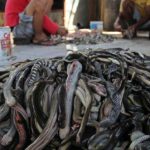
Facebook is rumoured to be acquiring a company that makes solar-powered drones. And while many people might be worried that the social network could spy on them from the skies, a more altruistic purpose is driving the company’s acquisition bid.
Facebook is tipped to spend up to $60million on buying Texas-based Titan Aerospace, which makes drones that can fly solo for five years without needing to land, in order to bring affordable internet access to some five billion people who don’t have it.
TechCrunch has reported that the social network, which is a backer of the Internet.org initiative, is interested in using some 11,000 high altitude drones to bring internet access to rural Africa and other parts of the world that are not connected.
The company is said to be interested in using the Solara 60 model, which is light-weight solar-powered and can fly at 65,000 feet for five years non-stop.
The Solara unmanned aircraft is 60 metres wide and self-sufficient as it is covered in around 3,000 solar panels producing about 7 kW of electricity.
As it flies above the clouds, it is exposed to sunlight constantly during daylight hours and store energy for the night flight.
The drones are described as ‘atmospheric satellites’ that could be used for surveillance, to monitor weather and communications.
Facebook is interested in the latter function and reportedly thinks the drones could be used to provide sustainable regional internet systems.
A source told TechCrunch that if Titan Aerospace was acquired, all its drones would be used for the Internet.org project, which is competing with Google’s ‘Project Loon’.
Google’s effort plans on using balloons instead of drones to bring internet access to rural and remote areas of the world.
Experts have pointed out that Facebook’s recent acquisition of WhatsApp could be used to send messages in places with a weak and slow internet connection, while a data compression technology it bought, Onavo, could be used so that functions need less transmitted data to make them work.
While Facebook’s aim is altruistic, the company would also seem to be looking to the future, as by connecting communities, more people than ever before will get hooked on social media.
Titan Aerospace’s Solara 50 and Solara 60 drones are currently demonstrator models that can be flown and are launched in catapult, but commercial versions are expected next year.
They are designed to be cheaper than the cost of a satellite, while carrying out similar functions such as surveillance, crop-monitoring, weather and disaster oversight.



![''I'm Holier Than You, I've Impacted Society More Than You'' - Lizzy Anjorin Slams Tope Alabi [Video] 4 ''I'm Holier Than You, I've Impacted Society More Than You'' - Lizzy Anjorin Slams Tope Alabi [Video]](https://media.kanyidaily.com/2025/04/06151416/Lizzy-Anjorin-Tope-Alabi-150x150.jpg)










